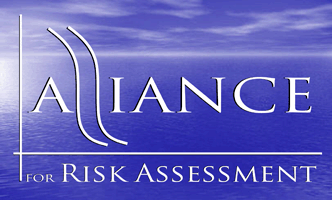Webcast
Sessions will be archived for six months at the following
location: http://www.texasadmin.com/cgi-bin/amtnrcc.cgi.
Information on connecting to the sessions can be found on
the Texas Admin website, including Tips for Viewing Video
Webcasts with RealPlayer at http://www.texasadmin.com/tips.htm.
The webcast screen on your computer is fairly
small, so it is not possible to clearly see the power point
slides on the webcast screen. Download the speaker's
presentations and have the webcast screen and the
presentations open on your computer at the same time. The
power point presentations can be downloaded at the following
website:
http://www.tceq.state.tx.us/implementation/tox/workshop-presented-by-the-alliance-for-risk-assessment
Workshop I Agenda
Date: March 16-18, 2010
Location: Texas Commission on Environmental Quality, Austin, Texas
Purpose: To advance the recommendations in the NAS (2008) report concerning issue identification (problem formulation) and dose-response analysis, through
selection of illustrative case studies for further development
Day 1: Tuesday, March 16th
Presentations of NAS Findings and Ongoing Activities.
Chair: Mike Honeycutt, Texas Commission on Environmental Quality
Welcome (8:30 to 8:45)
- Bryan Shaw, Chairman of Texas Commission on Environmental Quality. Welcome
Keynote Talks (8:45 to 10:00)
- Bette Meek, University of Ottawa. Problem formulation and risk assessment needs. presentation
- Ila Cote, U.S. Environmental Protection Agency (EPA). NAS (2008) findings and current EPA efforts on extensions of this work
Morning Break (10:00 to 10:30)
Ongoing Activities (10:30 to noon)
- Jennifer Seed, U.S. Environmental Protection Agency. Perspective on the current state-of-knowledge of mode of action as it relates to the dose response assessment of cancer and noncancer toxicity. presentation
- Martha Moore. National Center for Toxicological Research. Evaluation of a potential mutagenic MOA based on analysis of the weight of evidence and using the modified Hill criteria presentation
- Lorenz Rhomberg, Gradient. Implications of background and thresholds on dose response assessment. presentation
Lunch (noon to 1:00)
Ongoing Activities Continued (1:00 to 3:00)
- Steve Olin and Beth Julien, International Life Sciences Institute. Key events dose response assessment framework. presentation
- Rick Hertzberg, Biomathematics Consulting. Categorical regression as a predictive tool for determining risks above the Reference Dose (RfD) presentation
- Dale Hattis, Clark University. Probabilistic Reference Dose (RfD): The several ways to determine relevant values presentation
- B.G.H. Bokkers, Rijksinstituut voor Volksgezondheid en Milieu. Integrated probabilistic risk assessment approach for substances in food.
Afternoon Break (3:00 to 3:30)
Ongoing Activities Continued (3:30 to 5:30)
- Harvey Clewell, The Hamner Institutes for Health Sciences. Modeling of early key events based on genomics - and potential applications to nuclear-receptor-mediated toxicity. presentation
- Richard Carrier, Health Canada. Deriving drinking water guidelines: Health Canada's challenges and progress. presentation
- Paul Price, Dow Chemical Company. Using Empirical Data on Toxicity Pathways in the Prediction of Responses at Low Doses. presentation
- Clif McLellan, NSF International. Thresholds of Toxicological Concern. presentation
Opening mixer at the Garden Inn (dinner portion hors d’oeuvres, 6:30 to 9:00)
Day 2: Wednesday, March 17th
Perspectives on the NAS (2008) Report
Chair: Michael Dourson, Toxicology Excellence for Risk Assessment
Invited Perspectives on NAS (2008) (8:30-10:00)
- Adam Finkel, University of Pennsylvania. presentation
- Jim Bus, Dow Chemical Company.
- Bob Benson, U.S. Environmental Protection Agency.
- Michael Honeycutt, Texas Commission on Environmental Quality. presentation
Morning Break (10:00 to 10:30)
Invited Perspectives on NAS (2008) Continued (10:30-noon)
- Erik Janus, CropLife America. presentation
- Kenny Crump, Louisiana Tech. presentation
- John Christopher, California Environmental Protection Agency & TERA Fellow. presentation
- Open Invitation
Lunch (Noon to 1:00)
Consideration and Development of Case Study Proposals (1:00 to 2:30)
Chair: Bette Meek, University of Ottawa
- Questions will be entertained by meeting participants on case studies suggestions received prior to the meeting to ensure understanding. Questions will be answered by the person or group who offered the idea.
- Meeting participants will be asked to suggest new case studies based on prior day’s presentation or discussions, and to answer questions on these suggestions to ensure understanding.
Afternoon Break (2:30 to 3:00)
Break-out Group Discussions of Case Study Proposals (3:00 to 5:30)
- Chairs: Bette Meek, University of Ottawa; Jim Bus, Dow Chemical Company, John Christopher, California Environmental Protection Agency; Joseph (Kip) Haney, Texas Commission on Environmental Quality, TBA
- Rapporteurs: Lynne Haber, Toxicology Excellence for Risk Assessment, Elizabeth Spalt, Indiana Department of Environmental Management, Asish Mohapatra, Health Canada, Lynn Pottenger, Dow Chemical Company, Debra Kaden, Mickey Leland, Roberta Grant, Texas Commission on Environmental Quality
- Participants will work in smaller groups to flesh out case studies for subsequent meetings.
Day 3: Wednesday, March 18th
Consideration and Development of Case Study Proposals
Break-out Group Discussions of Case Studies (8:30 to 10:00)
- Participants will continue to work in smaller groups to flesh out case studies for subsequent meetings.
Morning Break (10:00 to 10:30)
Reports from Break-out Groups (10:30 to noon)
- Chair: Bette Meek, University of Ottawa
- Reports by Rapporteurs Elizabeth Spalt, Asish Mohapatra, Lynn Pottenger, Debra Kaden, and Lynne Haber.
Box Lunch (noon to 1:00)
Open discussion on improvements to the risk assessment process Adjourn (1:00 to 3:00)
- Chair: Michael Dourson, Toxicology Excellence for Risk Assessment
Adjourn (3:00)
All case study proposals received prior to the meeting and during the meeting will include 4 linked components: problem-formulation/dose-response-method/risk management outcome/team. These ideas will be sent to all participants prior to the meeting.

